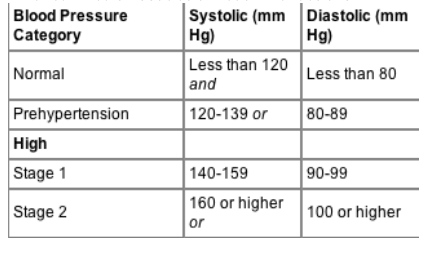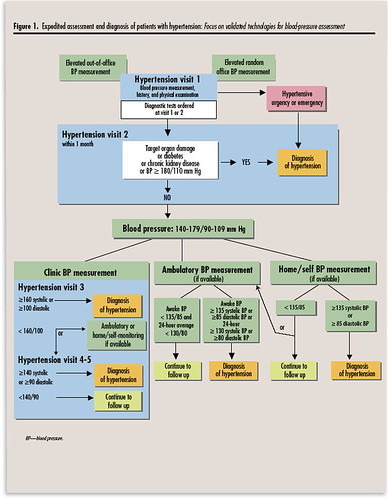BLOOD PRESSURE & HYPERTENSION

Blood pressure is the force that pushes blood through the blood vessels in your body. In people who have high blood pressure, blood is pushed through the blood vessels with greater force than normal. Another word for high blood pressure is "hypertension."


CAUSES OF HIGH BLOOD PRESSURE
1.)A diet high in fat and cholesterol
2.)Not exercising regularly or not exercising hard enough
3.)Being overweight
4.)A family history of high blood pressure
5.)Tobacco use
6.)Stress
7.)Some birth control medicines
8.)Kidney and hormone problems
SYSTOLE & DIASTOLE

Blood pressure is recorded as two numbers separated by a slash, like 120/80. The first number is the systolic (say: "sis-tol-ik") pressure; it is the force when the heart pumps. The second number is the diastolic (say: "die-uh-stol-ik") pressure; it is the force when the heart relaxes between beats.

SYSTOLIC & DIASTOLIC READINGS
Knowing both of your blood pressure readings can help your doctor tell if you have high blood pressure. Your doctor will want you to keep your usual blood pressure lower than 140/90. If you have diabetes, your doctor will want you to keep your blood pressure lower than 130/85.



EFFECTS OF HIGH BP ON BODY PARTS
High blood pressure can damage many parts of the body. If patient has high blood pressure, he/she has a higher risk for stroke, heart disease, heart attacks and kidney failure. Control of the blood pressure can reduce these risks.





ASSESSMENT & DIAGNOSIS OF HYPERTENSIVE PATIENTS

(CLICK IMAGE TO ENLARGE)
AMBULATORY BP MONITOR

It is a small machine, about the size of a portable radio. The Patient will wear it on a belt. The blood pressure cuff on the monitor can be worn under his/her clothes without anyone seeing it. The picture to thebelow shows a person wearing an ambulatory blood pressure monitor.

This machine lets doctor find out what patient's blood pressure was every 15 to 30 minutes of a normal day.The information collected by this machine can help patient and doctor see if the blood pressure treatment is working.
The doctor may want patient to use an ambulatory blood pressure monitor for one or more of the following reasons:
1.)If patient has "borderline" high blood pressure
2.)If patient and doctor can't keep your blood pressure under control
3.)If patient has blood pressure problems caused by other medicines
4.)If patient is pregnant and has high blood pressure
5.)If patient has fainting spells
The monitor may help doctor find out if patient is a person who only has high blood pressure when you are at the doctor's office. This is called "white-coat hypertension." If patient has this kind of hypertension, he/she may not need to take medicine.
WORK OF AMBULATORY BP MONITOR ON PATIENT
The small blood pressure cuff that is connected to the monitor will automatically check patient's blood pressure about every 30 minutes, even while he/she is sleeping. The patient also will be asked to keep a diary of his/her day's activities, so doctor will know when he/she was active and when she/she was resting. Some people feel a little sore from the frequent pressure checks. Some people get a rash, but it usually goes away without treatment.

After 24 hours of monitoring, patient will take the machine and diary to the doctor's office. The blood pressure information is transferred from the monitor to a computer or an analyzer. The computer helps the doctor make sense of the information. Your doctor will review the information with you and decide if your treatment program is working or if you need to make changes to it.


ADVICE FOR HIGH BP PATIENTS










No comments:
Post a Comment